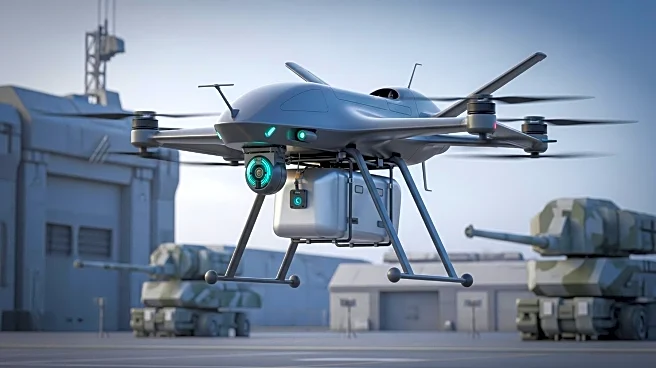What's Happening?
Pyka, a California-based autonomous aircraft company, has unveiled its new DropShip unmanned aerial vehicle (UAV) designed for defense applications. The DropShip offers modular payload configurations and a precision airdrop system capable of delivering supplies within 150 feet of a target. With a ferry range exceeding 3,500 miles and a payload capacity of up to 550 pounds, the UAV is equipped to support large-scale operations and tactical resupply missions. It can operate in an all-electric, low-signature mode for up to 45 minutes, making it suitable for covert missions. The system is designed for rapid deployment, transitioning from a standard 20-foot container to flight-ready status in under an hour, and can be operated by a single soldier.
Why It's Important?
The introduction of the DropShip UAV represents a significant advancement in autonomous cargo delivery for military operations. By enabling the transport of goods without risking human lives, Pyka addresses critical gaps in the defense sector. The UAV's ability to perform precision airdrops and operate covertly enhances logistical capabilities and operational flexibility for defense forces. This technology could reduce the reliance on traditional, manned aircraft for supply missions, potentially lowering costs and increasing efficiency. The DropShip's rapid deployment capability further supports military readiness and responsiveness in dynamic environments.
What's Next?
Pyka's DropShip UAV is poised to undergo further testing and evaluation by the U.S. Air Force and Army, which have already received several units. As the defense sector continues to explore autonomous solutions, Pyka may expand its offerings and collaborate with military stakeholders to refine and enhance the UAV's capabilities. The successful integration of DropShip into military operations could lead to broader adoption of autonomous systems in defense logistics, influencing future procurement and operational strategies.
Beyond the Headlines
The deployment of autonomous UAVs like DropShip raises important ethical and legal considerations regarding the use of unmanned systems in military operations. As these technologies become more prevalent, discussions around accountability, decision-making, and the potential for autonomous systems to replace human roles in critical missions will likely intensify. Additionally, the environmental impact of transitioning to electric-powered UAVs could contribute to sustainability efforts within the defense sector.










